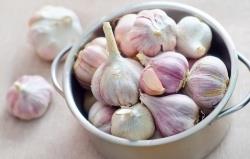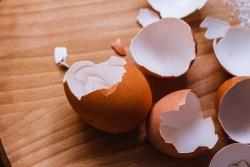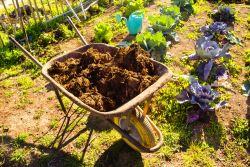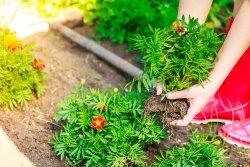How To Get Rid Of Garden Worms Naturally
Instead of reaching for toxic chemical products to control garden pests, go for the sensible option and use natural remedies to keep plants free of bugs.

1. Garlic
We all know garlic was used as protection against witches. Well now we can use garlic as a deterrent against unwanted garden pests.
When sprayed onto plants, garlic acts as a deterrent, encouraging insects to move on to more appetising plants.
Unlike many other types of insecticidal garden sprays, garlic can safely be applied to the leaves of plants.
Pop a clove of garlic into a blender and add a cup of water and puree until finely blended. Recycle an empty household cleaner spray bottle and add the garlic puree and then fill up with water.
Shake well and then spray onto plants.
2. Eggshells
Not only great for the compost heap, eggshells also act as fertiliser and pest repellent when added to the bottom of holes before planting.
The next time you plant vegetables, crush a couple of eggshells, not too finely, and add them to the bottom of the hole.
The sharp edges will deter cutworms, and crushed shells around the stem of plants will deter slugs and snails.

3. Ash
Snails and slugs also dislike sand, lime, and ashes, so the next time you have a wood braai, apply ash to the base of plants that are under threat.
4. Diatomaceous earth
Available at your local nursery or garden centre, Diatomaceous earth consists of fossilised remains of diatoms, single-cell organisms.
The glass-like nature of diatomaceous earth makes it one of the oldest forms of insecticide. The sharp surfaces cut through the insect cuticle and the insect dies of dehydration.
Diatomaceous earth kills slugs, snails and ants, and should only be applied to problem areas to avoid killing worms and similar garden-healthy occupants.
5. Manure
As an annual treatment for lawn and garden, there's nothing like manure for boosting growth and flower production.
Organic manure and fertiliser is available at your local Builders Warehouse or garden centre and can be dressed onto the lawn or mixed into flower beds.

By adding nutrients to the soil you increase the strength of the plant, and a healthy plant has a better chance at fighting off disease.
6. Pure soap
Having recently done research on Castile soap, it seems there is more to this soap than we know.
The gentle vegetable oil-based soap makes a gentle and effective insecticidal spray for the garden.
Simply fill up a spray bottle - a recycled household cleaner bottle - with water and a tablespoon of peppermint castile soap, to rid your plants of aphids and whiteflies.
7. Balsamic vinegar
Aged balsamic vinegar in a spray bottle is an ideal herbicide for problem weeds in between bricks and pavers in a driveway or path.
Simply spray the vinegar on the plant and it will wither away. The acetic acid in vinegar is what kills off the weeds, so the higher the percentage of acetic acid in the vinegar, the better.
Vinegar used for culinary purposes is relatively low (5%) in acetic acid, so repeated applications will be necessary when using it as a natural weed killer.
Another natural solution is to pour hot water onto unwanted weeds.
8. Cedar oil

Although not entirely garden pests, fleas are attracted to your pets and are then brought into the home.
Have a bottle or Cedar oil, aromatherapy oil, handy at home. Put a few drops on a soft cloth and wipe over your pet's coat once a month to control fleas.
You can also add a few drops of cedar oil to pet bedding and rugs.
Fleas detest cedar oil, as do bed bugs - but don't be tempted to rub yourself down with oil, rather apply a few drops to a cloth and wipe down the mattress occasionally. The same applies to Rosemary oil.
Cedar oil also protects against moths, so add a few drops to a potpourri sachet and pop into your closet or chest of drawers.
9. Marigolds
When establishing a vegetable patch or herb garden, be sure to plant marigolds as well. This plant is a natural insect repellent and will protect its surrounding neighbours.
10. Bananas
Did you know that bananas protect your roses from aphids? Try placing a few dried banana skins just below the surface around your rose bushes.
Bananas are also rich in potassium, which is a vital nutrient for gardens.
Add banana skins to your compost heap and mix them into the soil with a garden fork or bury dried or cut-up banana peels a few centimetres deep around the base of your rose bushes to deter aphids.
Bananas also attract birds and butterflies, so be sure to hang some out on a bird feeder.
Article courtesy of www.home-dzine.co.za
How To Get Rid Of Garden Worms Naturally
Source: https://www.property24.com/articles/10-home-remedies-for-eliminating-pests-in-the-garden/25615
Posted by: petersonagaisaink1965.blogspot.com

0 Response to "How To Get Rid Of Garden Worms Naturally"
Post a Comment